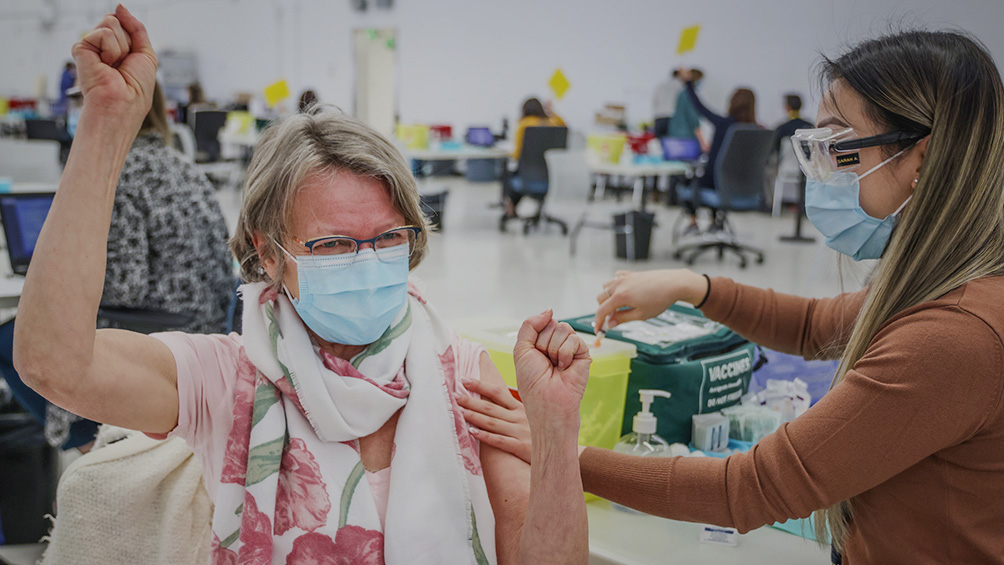
We are proud of our approximately 130,000 staff, physicians and volunteers who have worked so hard and sacrificed so much to protect the health of all Albertans during a global health emergency. We are also grateful to government and AHS’ many partners in healthcare philanthropy, academia, private business and the social sector for working together with us to get us through this pandemic and to start work on a better, more sustainable healthcare delivery system in the future.
The 2020-21 Alberta Health Services (AHS) Annual Report represents the most difficult and demanding 12 months in the organization’s history. Throughout this year, our teams and our people were responding to the most deadly global health crisis in a century: the COVID-19 pandemic. And yet, cast against a backdrop of illness, this report captures a year at AHS defined by resilience, courage, innovation, partnership and dedication. In no way do we wish to minimize the terrible toll of the virus on our physical and mental well-being, our healthcare delivery system, our friends and families, and on our society as a whole. Too many lives have been lost. However, AHS can look back at 2020-21 and know we responded quickly, we followed best evidence, we leveraged innovation and integration, and we did everything we could to keep Albertans safe while putting the province — and our healthcare delivery system — on the path toward a brighter post-pandemic future.
AHS has operated as part of a provincewide, fully integrated healthcare delivery system for more than a decade. During the last 12 years, our teams have responded to many emergencies, including the H1N1 pandemic of 2009-10; the Slave Lake and Fort McMurray wildfires of 2011 and 2016, respectively; and the southern Alberta floods of 2013. So when the first case of COVID-19 was confirmed in Alberta three weeks before the end of the 2019-20 fiscal year, AHS teams knew what they had to do. AHS established its Emergency Coordination Centre the following day, with Zone Emergency Operation Centres established shortly after, and we moved resources to areas of highest need, strategically and promptly.
For example, in the early months of the pandemic, we knew COVID-19 testing and contact tracing would be the best tools to slow the spread of the virus until vaccines became available. At the start of the pandemic, AHS was performing 35 COVID-19 tests per day; by the end of the 2020-21 fiscal year, AHS was performing more than 15,000 tests per day. Similarly, we had 50 contact tracers to start but, by redeploying human and financial resources, our contact tracing team expanded 50-fold to exceed 2,500 people capable of investigating up to 2,000 cases per day.
The first COVID-19 vaccines arrived in the province in December 2020, with the first member of the public — a resident at a long-term care centre in Medicine Hat — getting their immunization on December 30. An online booking tool for COVID-19 immunization was developed and launched; Albertans could also book through Health Link at 811 and through participating pharmacies. By the end of the 2020-21 fiscal year, more than 568,900 Albertans had received at least one of two required doses of vaccine; of those vaccinated, more than 322,500 had received both required doses.
Meanwhile, to maintain continuity of care during a time of physical distancing, AHS teams found new ways to serve Albertans and meet their physical and mental health needs. In-person chronic disease management classes were moved online, as were many addiction and mental health services, including group counselling. Virtual clinical visits replaced many in-person clinical visits due to public health measures. And AHS’ two main ‘home hospital’ projects — Virtual Hospital in Edmonton and Complex Care Hub in Calgary — accepted even more patients, keeping them safe and healthy in home rather than in a hospital unit. Both projects use digital patient monitoring to collect patient data that informs clinical decision-making, and leverage existing supports in the community, such as home care teams and specially trained community paramedics who can perform treatments and diagnostics that were previously performed in a hospital environment. All of this enables patients with complex health conditions and those recovering from surgery to receive high-quality acute care from a multidisciplinary team at home rather than in hospital. Both programs cared for a total of 530 patients this past fiscal year compared to 296 the previous year, representing nearly an 80 per cent increase.
AHS ended the 2020-21 fiscal year proud of our pandemic response under stressful and ever-changing circumstances, knowing there was still much work ahead. But despite the focus on COVID-19, AHS also pushed forward on other crucial work:
Approximately 60 initiatives identified in the implementation plan of the Alberta Health Services Performance Review were progressed, working in partnership with our employees and physicians, the communities we serve, and Albertans. This included consolidation of EMS dispatch, improved alignment between AHS and Alberta Precision Laboratories, and further reductions in discretionary spending. We progressed work around contracting of services such as Community Lab Services and Linen and Laundry Services.
We are pleased to present this report that highlights our achievements in 2020-21. We are proud of our approximately 130,000 staff, physicians and volunteers who have worked so hard and sacrificed so much to protect the health of all Albertans during a global health emergency. We are also grateful to government and AHS’ many partners in healthcare philanthropy, academia, private business and the social sector for working together with us to get us through this pandemic and to start work on a better, more sustainable healthcare delivery system in the future.

Board Chair,Alberta Health Services Board

President and CEO,
Alberta Health Services